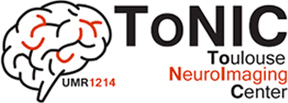Loading...
Bienvenue dans la collection HAL du TONIC
L'objectif principal de ToNIC est l'étude du cerveau humain principalement par la voie de l’imagerie. Le laboratoire est structuré en deux équipes de recherche et une équipe émergente :
- l'équipe Devin dont l'objectif est de développer de nouveaux outils de neuroimagerie qui peuvent être utilisés dans la recherche clinique et en neuroscience cognitive ;
- l'équipe iDream dont le projet repose sur la neuroimagerie et les techniques de stimulations cérébrales de la plasticité cérébrale post-lésionnelle ;
- l'équipe émergente 3D CHIP s'intéresse à l'ingénierie tissulaire par bio impression 3D et aux organoïdes sur puces de microfluidique.
Taux d'open access
66 %
Nombre de fichiers déposés
487
Nombre de références (notices) déposées
502
Sujets
Deep brain stimulation
Diffusion tensor imaging
Amyloid PET
Migraine with aura
Kinematics
Neurofibromatosis type 1
Trauma
Memory
Hemiplegia
Cerebral small vessel disease
Childhood trauma
Biomarkers
Hippocampus
Dementia
Major depressive disorder
Iron
Questionnaire
Radiotherapy
Developmental dyslexia
Epilepsy
Magnetic resonance imaging
Children
Ataxia
Child
Cerebrospinal fluid
Depressive disorder
NF1
Alzheimer disease
Brain injury
Language
Gait
Alzheimer’s disease
Glioblastoma
Multiple system atrophy
IRM
Guidelines
Biomarker
DTI
Brain
Electroconvulsive therapy
EMG
Clinical trials
Artificial intelligence
COVID-19
Disorders of consciousness
Handwriting
Machine learning
Rehabilitation
Depression
Thrombectomy
Electromyography
Ischemic stroke
France
Stroke
Motor control
Functional connectivity
Cerebral amyloid angiopathy
Diagnosis
Prognosis
Neurofeedback
Neuropsychology
Neurodegenerative diseases
Pain
IRMf
Coma
Amyloid
Frailty
Acceptability
Migraine
Electroencephalography
FMRI
Parkinson's disease
MRI
Intracerebral hemorrhage
ADHD
Brain injuries
MSA
Procedural memory
Parkinson’s disease
Clinical trial
Evaluation
Comorbidity
Alzheimer's disease
Developmental coordination disorder
Muscle hypertonia
Mild cognitive impairment
Humans
Neuroinflammation
Aging
Treatment-resistant depression
H-reflex
PET
EEG
Cognition
Neuroimaging
Quality of life
Psychiatry
Frontotemporal dementia
Depressive disorders
Upper extremity
Dernières publications
-
C. Lebely, E. Lepron, C. Hamery, E. Montane, I. Bigarre, et al.. Cognitive remediation combined with brain stimulation after acquired brain injury: A single-case experimental design with 15 individuals. Annals of Physical and Rehabilitation Medicine, 2025, 68 (1), pp.101892. ⟨10.1016/j.rehab.2024.101892⟩. ⟨hal-04943727⟩
-
-
Ronan Le Guillou, J. Froger, M. Morin, M. Couderc, C. Cormier, et al.. Specifications and functional impact of a self-triggered grasp neuroprosthesis developed to restore prehension in hemiparetic post-stroke subjects. BioMedical Engineering OnLine, 2024, Biosystems & Biorobotics, 23 (1), pp.129. ⟨10.1186/s12938-024-01323-y⟩. ⟨hal-04879755⟩
-
-
Luigi Lorenzini, Alessio Maranzano, Silvia Ingala, Lyduine Collij, Mario Tranfa, et al.. Association of Vascular Risk Factors and Cerebrovascular Pathology With Alzheimer Disease Pathologic Changes in Individuals Without Dementia. Neurology, 2024, 103 (7), pp.1265. ⟨10.1212/WNL.0000000000209801⟩. ⟨hal-04904167⟩
-
-

